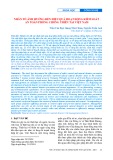
64
Tạp chí Kinh tế - Luật và Ngân hàng
Năm thứ 27(6)- Tháng 6. 2025- Số 278
© Học viện Ngân hàng
ISSN 3030 - 4199
Tác động của tài chính khí hậu đến tính bền vững
môi trường: Bằng chứng thực nghiệm từ phân tích
liên quốc gia
Ngày nhận: 09/01/2025 Ngày nhận bản sửa: 13/05/2025 Ngày duyệt đăng: 03/06/2025
Tóm tắt: Tài chính khí hậu là nguồn tài chính hỗ trợ các nỗ lực giảm thiểu phát
thải khí nhà kính thích ứng với các tác động tiêu cực của biến đổi khí hậu,
được coi là một nỗ lực quan trọng góp phần vào bảo vệ sự bền vững của môi
trường. Tuy nhiên, thực tiễn vẫn còn có những tranh cãi về mức độ hiệu quả
thực sự của dòng vốn này. Nghiên cứu này sẽ góp phần đánh giá về tác động
của tài chính khí hậu đến tính bền vững môi trường trên thực tiễn với dữ liệu
The impact of climate finance on environmental sustainability: Empirical evidence from a
cross-country analysis
Abstract: Climate finance refers to financial resources mobilized to support efforts in reducing greenhouse
gas emissions and adapting to the adverse impacts of climate change. It is widely regarded as a critical
instrument contributing to environmental sustainability. However, there remains ongoing debate regarding
the actual effectiveness of these financial flows in practice. This study seeks to provide empirical evidence
on the impact of climate finance on environmental sustainability, utilizing panel data from 24 countries
over the period 2012- 2022. To enhance the reliability of the results and address common econometric
issues such as heteroskedasticity, cross-sectional dependence, and endogeneity, the study employs
a combination of methodologies: Panel-Corrected Standard Errors (PCSE), Feasible Generalized Least
Squares (FGLS), and the two-step Generalized Method of Moments (GMM) estimator. The analysis provides
statistically significant evidence that climate finance exerts a negative impact on all three key indicators of
environmental sustainability: the Environmental Performance Index, Environmental Health, and Ecosystem
Vitality. Furthermore, the study finds that population and savings rate negatively influence environmental
sustainability, while economic growth has a positive effect.
These findings suggest that, if not properly monitored and strategically designed, climate finance could
result in unintended environmental consequences. In other words, policymakers must develop robust
institutional frameworks to ensure that climate finance is appropriately directed and genuinely contributes
to environmental protection and sustainable development.
Keywords: Climate Finance, Environmental Sustainability, Climate Change, Cross-country model
Doi: 10.59276/JELB.2025.06.2866
Nguyen, Hong Yen
Email: yennh@hvnh.edu.vn
Organization: Banking Academy of Vietnam
Nguyễn Hồng Yến
Học viện Ngân hàng, Việt Nam

NGUYỄN HỒNG YẾN
65
Năm thứ 27(6)- Tháng 6. 2025- Số 278- Tạp chí Kinh tế - Luật và Ngân hàng
thu thập từ 24 quốc gia trong giai đoạn 2012- 2022. Nhằm tăng độ tin cậy của
kết quả và khắc phục các vấn đề kinh tế lượng phổ biến như phương sai thay
đổi, phụ thuộc chéo và khả năng nội sinh, nghiên cứu đã sử dụng kết hợp các
phương pháp: mô hình sai số chuẩn được hiệu chỉnh theo bảng, bình phương
tối thiểu tổng quát khả thi và phương pháp Moment tổng quát hệ thống hai
bước để phân tích số liệu. Kết quả phân tích đưa ra bằng chứng thống kê về
tác động tiêu cực của tài chính khí hậu đến cả ba chỉ số đại diện cho tính bền
vững môi trường: chỉ số hiệu suất sinh thái, sức khỏe môi trường và sức sống
hệ sinh thái. Bên cạnh đó, nghiên cứu cũng cho thấy dân số và tỷ lệ tiết kiệm
có ảnh hưởng tiêu cực tới sự bền vững của môi trường, trong khi tăng trưởng
kinh tế lại có tác động tích cực. Các phát hiện này hàm ý rằng nếu không được
giám sát và thiết kế hợp lý, tài chính khí hậu có thể dẫn đến những hệ quả
không mong muốn cho môi trường. Nói cách khác, các nhà hoạch định cần
xây dựng khuôn khổ thể chế chặt chẽ, đảm bảo rằng các nguồn tài chính khí
hậu được định hướng đúng và thực sự đóng góp bảo vệ môi trường và hướng
tới phát triển bền vững.
Từ khóa: Tài chính khí hậu, Tính bền vững môi trường, Biến đổi khí hậu, Mô hình
liên quốc gia
1. Giới thiệu
Biến đổi khí hậu đang trở thành một trong
những thách thức toàn cầu lớn nhất thế kỷ
XXI, gây ra những tác động sâu rộng đến
môi trường sinh thái, sức khỏe con người
và tăng trưởng kinh tế. Đặc biệt, hệ sinh
thái ở các nước đang phát triển đang bị ảnh
hưởng nghiêm trọng do thải ra khí nhà kính
như carbon, ngoài ra còn làm trầm trọng
vấn đề ô nhiễm không khí và nhiệt độ tăng
cao (Apergis & Apergis, 2020; Rauf và
cộng sự, 2023). Những thay đổi về nhiệt độ
và lượng mưa, và cuối cùng là các thảm họa
môi trường sẽ tiếp tục diễn ra khi khí nhà
kính tiếp tục tích tụ trong khí quyển. Do đó,
việc thực hiện các biện pháp giảm phát thải
là cấp thiết để giảm thiểu những tác động
tiêu cực của biến đổi khí hậu (Gharbi và
cộng sự, 2025). Bergius và cộng sự (2020)
chỉ ra rằng việc tạo ra một nền kinh tế xanh
đòi hỏi phải phân bổ tài sản và đầu tư vào
các ngành công nghiệp cam kết giảm ô
nhiễm. Trong bối cảnh giảm thiểu ô nhiễm
và thúc đẩy sự phát triển của các doanh
nghiệp xanh, Anser và cộng sự (2020) đã
nhấn mạnh vai trò quan trọng của tài sản
tài chính và cơ cấu kinh tế. Để cắt giảm chi
phí hiệu quả và huy động vốn ở mức độ và
tốc độ cần thiết, những tiến bộ trong công
nghệ và việc phát hành các sản phẩm tài
chính sáng tạo là điều bắt buộc. Cùng với
đó, các nhà hoạch định chính sách, đặc biệt
tại các quốc gia mới nổi và đang phát triển,
nhận thấy lĩnh vực tài chính khí hậu đóng
vai trò quan trọng và phù hợp trong quá
trình thực hiện Thỏa thuận Paris và hướng
tới hoàn thành các Mục tiêu Phát triển Bền
vững. Trước thực trạng này, tài chính khí
hậu (Climate Finance- CF) được kỳ vọng
là công cụ quan trọng nhằm hỗ trợ các quốc
gia, đặc biệt là các nước đang phát triển, ứng
phó hiệu quả với các tác động môi trường
tiêu cực thông qua đầu tư xanh, giảm phát
thải và thích ứng bền vững. Tài chính khí
hậu đề cập đến các dòng vốn hướng đến

Tác động của tài chính khí hậu đến tính bền vững môi trường:
Bằng chứng thực nghiệm từ phân tích liên quốc gia
66 Tạp chí Kinh tế - Luật và Ngân hàng- Năm thứ 27(6)- Tháng 6. 2025- Số 278
phát triển một nền kinh tế ít carbon và tăng
cường khả năng thích ứng với khí hậu, với
mục tiêu trực tiếp hoặc gián tiếp là giảm
phát thải khí nhà kính. Tài chính khí hậu
góp phần đạt được các mục tiêu trung hòa
carbon theo Thỏa thuận Paris và thúc đẩy
sự phát triển bền vững về mặt môi trường
(Le, 2022).
Các nhà nghiên cứu đã bày tỏ nhiều quan
điểm khác nhau về sự đóng góp của tài
chính khí hậu (CF) tới tính bền vững của
môi trường (Environment Sustainablility-
ES). Người ta cho rằng đầu tư tài chính có
ảnh hưởng đáng kể đến các công nghệ tiến
bộ và nền kinh tế tăng trưởng, đặc biệt là ở
các quốc gia đang phát triển (Tuan và cộng
sự, 2009). Nhiều học giả cho rằng hiệu
quả năng lượng được tạo ra thông qua thay
đổi công nghệ sản xuất. Trong số các biện
pháp khả thi, CF là một yếu tố quan trọng
để đạt được loại tiến bộ này vì nó khuyến
khích những tiến bộ công nghệ ở quốc
gia tiếp nhận (Sapkota & Bastola, 2017).
Theo Agrawal và cộng sự (2023), CF có
thể góp phần bảo tồn môi trường bằng cách
giảm lượng khí thải carbon. Mặt khác, việc
thay đổi các ngành công nghiệp được coi
là “tiêu tốn tài nguyên” hoặc gây ô nhiễm
nhiều là một cách khác mà CF góp phần
vào việc giảm lượng khí thải (Abbas và
cộng sự, 2023). Mặc dù CF được xem là
một công cụ quan trọng để thúc đẩy sự phát
triển bền vững, nhưng một số nghiên cứu
đã chỉ ra rằng trong một số trường hợp, nó
có thể gây ra những trở ngại cho ES. Một
số rào cản phổ biến bao gồm chi phí giao
dịch cao, thiếu khung pháp lý nhất quán, và
nguy cơ “greenwashing”- tức là việc các tổ
chức tài chính đầu tư vào các dự án không
thực sự thân thiện với môi trường nhưng
vẫn được quảng bá là “xanh” (Raman và
cộng sự, 2025). Ngoài ra, nghiên cứu của
Chaudhary và cộng sự (2024) đã chỉ ra
rằng các rào cản về thể chế, khả năng tiếp
cận hạn chế và những ràng buộc chính trị
có thể khiến CF không phát huy hiệu quả
tối đa trong việc thúc đẩy ES (Chaudhary
và cộng sự, 2024). Hơn nữa, nghiên cứu
của Zakari và Khan (2021) còn phát hiện
rằng trong một số trường hợp, GF có thể
dẫn đến sự gia tăng tiêu thụ năng lượng
và đô thị hóa, làm suy giảm ES (Zakari &
Khan, 2021).
Như vậy, tác động thực sự của tài chính khí
hậu đến tính bền vững môi trường vẫn còn
nhiều tranh cãi và chưa được kiểm chứng
rõ ràng trong các nghiên cứu định lượng ở
cấp độ quốc gia. Hơn nữa các nghiên cứu
hiện nay mới chỉ dừng lại ở việc đánh giá
hiệu quả tài chính khí hậu trên một hoặc
một vài khía cạnh cụ thể của môi trường
(như phát thải CO₂ hay đầu tư vào năng
lượng tái tạo), mà thiếu cách tiếp cận toàn
diện và đa chiều đối với tính bền vững
môi trường. Bên cạnh đó, ít có nghiên cứu
kiểm tra đồng thời tác động của CF lên các
chỉ số tổng hợp như chỉ số hiệu suất sinh
thái (EPI), sức khỏe môi trường (HLT) và
sức sống hệ sinh thái (ECO). Nghiên cứu
này đóng góp vào khoảng trống đó bằng
cách sử dụng bộ dữ liệu liên quốc gia và
mô hình sai số chuẩn được hiệu chỉnh theo
bảng (Panel-Corrected Standard Errors-
PCSE) để xác định mối liên hệ thực
nghiệm giữa tài chính khí hậu và mức độ
bền vững môi trường tại 24 quốc gia trong
giai đoạn 2012- 2022. Nghiên cứu hướng
đến mục tiêu chính là đánh giá tác động
của tài chính khí hậu đến tính bền vững
môi trường, thông qua việc phân tích các
chỉ số hiệu suất sinh thái, sức khỏe môi
trường và sức sống hệ sinh thái- những
thước đo đa chiều phản ánh toàn diện mối
quan hệ giữa môi trường và chính sách
tài chính khí hậu. Đồng thời, nghiên cứu
cũng xem xét ảnh hưởng của các yếu tố
kinh tế vĩ mô như tăng trưởng GDP, dân
số và tỷ lệ tiết kiệm đến sự thay đổi chất

NGUYỄN HỒNG YẾN
67
Năm thứ 27(6)- Tháng 6. 2025- Số 278- Tạp chí Kinh tế - Luật và Ngân hàng
lượng môi trường.
Ngoài phần Giới thiệu bài viết gồm Tổng
quan nghiên cứu trình bày trong phần 2;
Phương pháp nghiên cứu ở phần 3; Kết quả
nghiên cứu và thảo luận thể hiện ở phần
4. Cuối cùng, những hàm ý chính sách và
hướng nghiên cứu trong tương lai sẽ được
trình bày ở phần 5.
2. Tổng quan nghiên cứu và đề xuất giả
thuyết nghiên cứu
2.1. Cơ sở lý luận
Tài chính khí hậu (CF) được hiểu là sự
phát triển các công cụ tài chính hướng tới
việc mang lại các giải pháp cho các thách
thức liên quan tới môi trường (Abbas và
cộng sự, 2023). Đây là nguồn tài chính địa
phương, quốc gia hoặc xuyên quốc gia-
được rút ra từ các nguồn tài chính công, tư
nhân và các nguồn thay thế- nhằm hỗ trợ
các hành động giải quyết vấn đề biến đổi
khí hậu. Hơn nữa, các dự án dành riêng
cho bảo vệ môi trường sẽ cần được đảm
bảo nguồn tài trợ thông qua các công cụ
và hệ thống tài chính khí hậu này. Chính
phủ khuyến khích các tổ chức tài chính
áp dụng các hoạt động tài chính khí hậu
thành công cụ tài chính then chốt để phát
triển nền kinh tế xanh (El Khoury và
cộng sự, 2024).Tính bền vững môi trường
thể hiện ở hiệu suất môi trường của các
chính sách của một quốc gia, làm nổi bật
sự suy thoái của các hệ thống môi trường
và sinh thái trên hành tinh mà con người
đang sinh sống. Sự phát triển của nền kinh
tế toàn cầu tiếp tục phụ thuộc nhiều vào
nhiên liệu hóa thạch sẽ dẫn đến ô nhiễm
không khí và nước đang diễn ra, axit hóa
đại dương và nồng độ khí nhà kính trong
khí quyển ngày càng tăng. Những thay
đổi này đe dọa sự sống còn của các loài
vốn đã phải chịu đựng tình trạng mất môi
trường sống trên diện rộng, đẩy chúng đến
gần hơn với sự tuyệt chủng.
Tài chính khí hậu là một trong các nguồn
cung cấp thiết yếu cho phát triển tài chính
quốc tế, nhưng nó cũng có những ảnh
hưởng xã hội và sinh thái đáng kể (tích
cực và tiêu cực) (Boamah và cộng sự,
2022; Qamri và cộng sự, 2022, Stroebel
& Wurgler, 2021). Tài chính khí hậu là
hoạt động phát triển hệ thống tài chính
để nhằm mục tiêu vào các khoản đầu tư
thúc đẩy các mục tiêu về môi trường và
khí hậu. CF có thể góp phần bảo tồn môi
trường bằng cách giảm phát thải carbon.
Mặt khác, việc thúc đẩy các ngành công
nghiệp được coi là “tiêu tốn tài nguyên”
hoặc gây ô nhiễm nhiều là một cách khác
mà các hoạt động đầu tư tài chính đã gián
tiếp góp phần vào lượng khí thải CO2
(Lee và cộng sự, 2022; Steckel và cộng
sự, 2017). Khái niệm xanh trong tài chính
khí hậu thể hiện ở những đóng góp lâu
dài của chúng vào việc giảm phát thải và
các hoạt động có xu hướng gây ô nhiễm
môi trường. Khái niệm này bao quát cả
khi việc sử dụng các dòng tài chính vào
các hoạt động mà gây ra hậu quả tiêu cực
trước mắt hoặc cục bộ đối với môi trường
(Hintošová & Bódy, 2023).
Về mặt lý thuyết, hiện nay có một số cơ
chế mà CF liên quan đến các vấn đề môi
trường, đặc biệt là giả thuyết “thiên đường
ô nhiễm” (Pollution Haven Hypothesis-
PHH). PHH cho rằng các quốc gia có quy
định môi trường lỏng lẻo sẽ thu hút các
ngành công nghiệp gây ô nhiễm từ các
quốc gia có quy định nghiêm ngặt hơn.
Trong bối cảnh tài chính khí hậu, PHH đã
giúp giải thích cách mà dòng vốn tài trợ
cho các vấn đề khí hậu và môi trường có
thể tác động tiêu cực đến tính bền vững
của môi trường. Cụ thể, nếu không có các
cơ chế giám sát chặt chẽ, các khoản tài
chính khí hậu có thể được sử dụng để tài

Tác động của tài chính khí hậu đến tính bền vững môi trường:
Bằng chứng thực nghiệm từ phân tích liên quốc gia
68 Tạp chí Kinh tế - Luật và Ngân hàng- Năm thứ 27(6)- Tháng 6. 2025- Số 278
trợ cho các dự án không “xanh” hoặc “ít
xanh”, thay vì thực sự thúc đẩy công nghệ
sạch hoặc cải thiện hiệu suất môi trường
(Kharb và cộng sự, 2024). Một nghiên
cứu về các quốc gia BRICS đã cho thấy
rằng, mặc dù tài chính khí hậu có tiềm
năng cải thiện tính bền vững môi trường,
nhưng trong một số trường hợp, nó cũng
có thể vô tình làm trầm trọng thêm hiện
tượng “thiên đường ô nhiễm” bằng cách
khuyến khích dòng vốn vào các nước có
tiêu chuẩn môi trường thấp, từ đó tiếp
tục gây tổn hại đến môi trường (Zhang &
Linjin, 2025). Điều này đặt ra yêu cầu cấp
thiết về việc xây dựng các cơ chế giám sát
chặt chẽ hơn trong tài chính khí hậu nhằm
đảm bảo rằng các khoản đầu tư thực sự
hỗ trợ phát triển bền vững, thay vì vô tình
thúc đẩy xu hướng chuyển dịch ô nhiễm
giữa các quốc gia.
2.2. Tổng quan nghiên cứu thực nghiệm
Việc CF có ảnh hưởng đến chất lượng sinh
thái được hỗ trợ bởi rất nhiều dữ liệu khoa
học. Ví dụ, một kết quả thiết yếu của CF
là sự gia tăng phát thải khí nhà kính (El
Khoury và cộng sự, 2024). Tuy nhiên, một
vài học giả cho thấy CF có tác động tích
cực đến các mối quan tâm về môi trường,
là sự phát triển của công nghệ bền vững
và thân thiện với môi trường hơn (Meo &
Karim, 2022; Wu và cộng sự, 2024).
Thomason và cộng sự (2018) nhấn mạnh
rằng việc sử dụng các hình thức tài chính
mới giải quyết các vấn đề tài chính khí hậu
toàn cầu, bao gồm huy động vốn nhàn rỗi
và các cơ chế tài trợ linh hoạt từ các thị
trường tài chính tư nhân. Trong bối cảnh
rộng hơn, Marke và Sylvester (2018) cho
rằng tài chính bền vững và đầu tư xanh
cung cấp nền tảng tốt nhất để áp dụng
Blockchain như một “fintech” để kết hợp
công nghệ và tài chính. Ngược lại, ngành
năng lượng cung cấp dữ liệu sản xuất có
giá trị rất hữu ích cho nghiên cứu và phát
triển các sản phẩm tài chính, trong khi các
sản phẩm tài chính mới có lợi cho ngành
năng lượng. Trong số các công nghệ tài
chính, bao gồm dữ liệu lớn, điện toán đám
mây, máy học và công nghệ điện toán phân
tán, Blockchain là công nghệ có tác động
và mang tính cách mạng nhất đối với kiến
trúc tài chính phục vụ cho các vấn đề cải
thiện khí hậu và môi trường, đặc biệt là
trong việc giảm chi phí quản lý và mở rộng
ranh giới quản lý.
Một nghiên cứu khác được thực hiện vào
năm 2019 bởi Pisani và cộng sự đã xem xét
cách CF ảnh hưởng đến tính bền vững về
môi trường của các thành phố và kết luận
rằng nó có thể giúp tạo ra các thành phố
xanh và thông thoáng hơn (Pisani & cộng
sự, 2019). Tương tự như vậy, CF trong các
công nghệ xanh hơn đã được nhấn mạnh bởi
Capasso và cộng sự (2019). Estevão (2020)
đã đề xuất các phương án tài chính thân
thiện với môi trường, chẳng hạn như đầu
tư xanh và thuế môi trường, như một cách
thiết thực để thúc đẩy mở rộng tài chính
trong bối cảnh khủng hoảng COVID-19.
Trong khi đó, Tawiah và cộng sự (2021)
đã tiến hành phân tích kỹ lưỡng một số địa
điểm tăng trưởng xanh và khuyến nghị các
quốc gia có nền kinh tế kém phát triển nên
ưu tiên CF để quản lý thành công quá trình
tiến triển của họ trong các sáng kiến tăng
trưởng xanh.
Alshubiri và cộng sự (2021) đã thực hiện
một nghiên cứu để đánh giá ảnh hưởng của
việc huy động các nguồn tài chính phục vụ
cho các vấn đề cải thiện khí hậu và môi
trường đối với việc sử dụng nhiên liệu xanh
và nhiên liệu hóa thạch. Kết quả từ các
quốc gia thành viên OPEC đã chứng minh
mối quan hệ thuận chiều giữa loại hình tài
chính này và lượng khí thải CO2, và CF và
sản lượng năng lượng xanh có mối quan hệ





![Sổ tay Phòng chống lụt bão [Cập nhật mới nhất]](https://cdn.tailieu.vn/images/document/thumbnail/2025/20250605/vijiraiya/135x160/443_so-tay-phong-chong-lut-bao.jpg)






![Tài liệu Vi sinh vật môi trường [Mới nhất]](https://cdn.tailieu.vn/images/document/thumbnail/2025/20251123/ngkimxuyen/135x160/21891763953413.jpg)
![Sổ tay truyền thông Phân loại chất thải rắn sinh hoạt trên địa bàn tỉnh Quảng Nam [Chuẩn nhất]](https://cdn.tailieu.vn/images/document/thumbnail/2025/20251114/kimphuong1001/135x160/1701763094001.jpg)


![Quản lý chất thải nguy hại: Sổ tay Môi trường [Chuẩn nhất]](https://cdn.tailieu.vn/images/document/thumbnail/2025/20251029/kimphuong1001/135x160/9011761720170.jpg)









